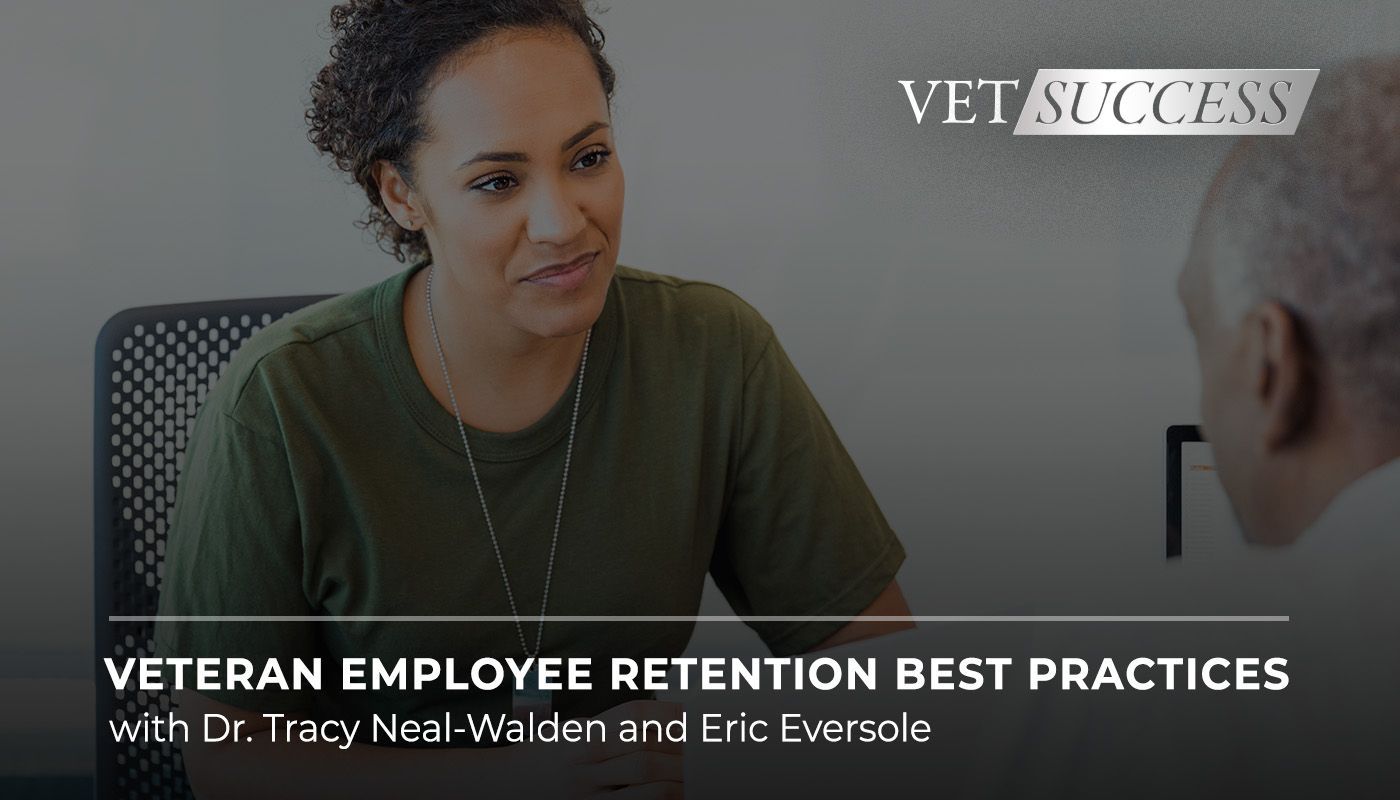
The competition for talent is intense. Some of the factors contributing to this competition include brain drain in major economic hubs, job seekers’ prioritization of work-life balance and purpose-driven employers, and the expansion of remote and hybrid work options.
With the competition for talent more pressing than ever, organizations need to invest in retaining their top talent, particularly veterans, who are 39% more likely to be promoted than their nonveteran peers and have 2.9 times more work experience on average.
While many companies are still looking to improve their processes specific to military veteran recruitment, many of the best practices for employee retention can be applied to keep veteran employees on board. American Veterans Group discussed the broadly applicable, and more nuanced considerations of military veteran retention with Dr. Tracy Neal-Walden, chief clinical officer at Cohen Veterans Network, and Eric Eversole, vice president of the U.S. Chamber of Commerce and president of Hiring our Heroes.
Meet people where they are, and look for the right fit.
While veterans, of course, share the experience of having been in the military, their life experience prior to active service, position and length of service, and process for transitioning back to civilian life varies greatly. Employers should consider this diversity of experience, skill, and background, as they seek to recruit and retain veteran employees. As Eric Eversole says, “there is no one-size-fits-all approach to how we help service members transition.” The key, Eversole shared, is to meet people where they are.
“We really focus on the that model, meeting people where they are, not where we want them to be. We’ll get them there and figure out what the pathway looks like based on their unique needs.” -Eric Eversole
Meeting veteran job seekers where they are and
assessing individual strengths and transferrable skills is critical to ensuring that veterans are hired into the right positions. As reported by
Forbes, employees across the board expect a personalized, high-quality employee experience, throughout their job search, onboarding, and professional development. This personalization is perhaps even more applicable to veteran job seekers however, as they are
38% more likely to be underemployed than nonveterans. Employers can use programs like apprenticeships and internships to get to know their veteran candidates better, and ensure they are hired into positions that best fit their skillsets.
“We have to start to evaluate talent and skillsets beyond a piece of paper, and the best way to do that is to get up close and personal. It allows companies to really evaluate military talent in the workforce … and to better understand what level to bring the person in, how they’re going to fit in, and whether they’re going to be a good fit” - Eric Eversole
Drive home your company’s mission and purpose.
As millennials and Gen-Z comprise an increasing portion of today’s workforce, the power – and business proposition – for purpose-driven companies has increased significantly as a primary driver for employee engagement and performance. The importance of organizations' missions and employees’ sense of purpose is highly relevant to veteran job seekers as well.
The military has a very clear mission and active service members have clarity on exactly how their day-to-day activities contribute to that overarching mission. Veterans often value that same sense of purpose and clarity in their civilian careers.
“Veterans want to have a strong mission, and to feel like they’re making a difference.” - Dr. Tracy Neal-Walden
Organizations should emphasize their mission in their
employee branding, and specifically call out the role the veteran job seeker, or hire, plays in driving the mission forward.
Provide continual feedback and development opportunities.
With a clearly defined structure for rank and advancement in the military, many veterans are accustomed to more rigid promotion and evaluation processes, and professional development opportunities and requirements.
“It is inherent for most veterans, because when you’re in the military, you continue to advance in your rank, and with those advancements comes additional coursework, so you continue to learn and grow throughout your career.” - Dr. Tracy Neal-Walden
Having clearly defined and regular performance review opportunities, sharing upskilling and professional development resources and programming, and plugging veteran employees into mentorship networks are valuable ways to keep veteran employees, and employees in general for that matter, engaged and dedicated to the organization.
Veterans, like civilian employees, are ultimately looking for employment in which they are adequately challenged, feel a sense of purpose and mission, and have opportunities for growth and advancement. And while there is not a silver bullet for veterans’ transition to civilian life, meeting people where they are and investing in getting it right for the individual will ultimately pay back dividends.
If you’re interested in more specific feedback and guidance on how to better recruit and retain veteran employees, join American Veterans Group, Dr. Tracy Neal-Walden, Eric Eversole, and other veteran employment experts for the virtual VetSuccess 2023 conference, October 25 1-3 pm EST.
About Our Guest Experts
Dr. Tracy Neal-Walden served 24-plus years as a military psychologist in the U.S. Air Force, retiring in the rank of Colonel, she served as the Air Force’s Director of Psychological Health and Chief of Behavioral Health. Now, as Chief Clinical Officer, Dr. Neal Walden provides clinical vision and strategic leadership for Cohen Veterans Network in mental health, psychiatry, substance use, case management and clinical training focusing on the needs of veterans and military families, and clinical staff.
Eric Eversole has spent 20-plus years advocating on behalf of active-duty military, veterans, and their spouses. Served as a Judge Advocate in the Navy JAG Corps, founding the Military Voter Protection Project. Currently is a vice president at the U.S. Chamber of Commerce and president of Hiring Our Heroes. Hiring our Heroes Hiring advances nationwide efforts to improve the quality of life, morale, and stability of military families by connecting veterans, transitioning service members, and military spouses with meaningful employment opportunities across the country and internationally.


